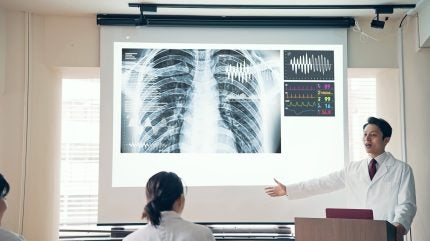

US-based Genprex has received approval from the Safety Review Committee (SRC) to proceed to the highest dose group of 0.12mg/kg in the Phase I portion of the Acclaim-3 trial of Reqorsa Gene Therapy (quaratusugene ozeplasmid) for extensive stage small cell lung cancer (ES-SCLC).
The trial is designed to evaluate the gene therapy, along with Genentech’s Tecentriq (atezolizumab) as maintenance therapy, for ES-SCLC patients.

Discover B2B Marketing That Performs
Combine business intelligence and editorial excellence to reach engaged professionals across 36 leading media platforms.
This latest move comes after the company completed the 0.09mg/kg dose group.
The SRC, consisting of three principal investigators, observed no dose-limiting toxicities in the current group and recommended the progression to the next dose level. The first patient in this portion of the trial experienced a partial remission, indicating the therapy’s potential clinical benefit.
Genprex president and CEO Ryan Confer said: “We believe the SRC’s recommendation to advance to the highest dose group of the Phase I portion of the trial is another clinical validation for our REQORSA development programme.
“We are proud of the achievements so far in the Phase I portion of the trial, which has demonstrated a favourable safety profile for REQORSA in the first trial to use REQORSA for SCLC patients. We look forward to continuing to treat these patients while we work toward bringing new therapies to lung cancer patients with unmet medical need.”

US Tariffs are shifting - will you react or anticipate?
Don’t let policy changes catch you off guard. Stay proactive with real-time data and expert analysis.
By GlobalDataThe combination of REQORSA and Tecentriq has received fast-track designation for the treatment of the Acclaim-3 patient population. REQORSA received orphan drug designation to treat SCLC.
The primary objective of the Phase I portion is to establish the maximum tolerated dose or the recommended Phase II dose.
Following the completion of the Phase I stage, the trial will proceed to Phase II, enrolling 50 patients across ten to 15 US sites.
The primary endpoint for Phase II is to assess the 18-week progression-free survival rate. A futility analysis is planned after the 25th patient reaches 18 weeks of follow-up. The trial’s Phase I enrolment is expected to conclude, with Phase II commencing in the second half of 2024.
Cell & Gene therapy coverage on Clinical Trials Arena is supported by Cytiva.
Editorial content is independently produced and follows the highest standards of journalistic integrity. Topic sponsors are not involved in the creation of editorial content.





